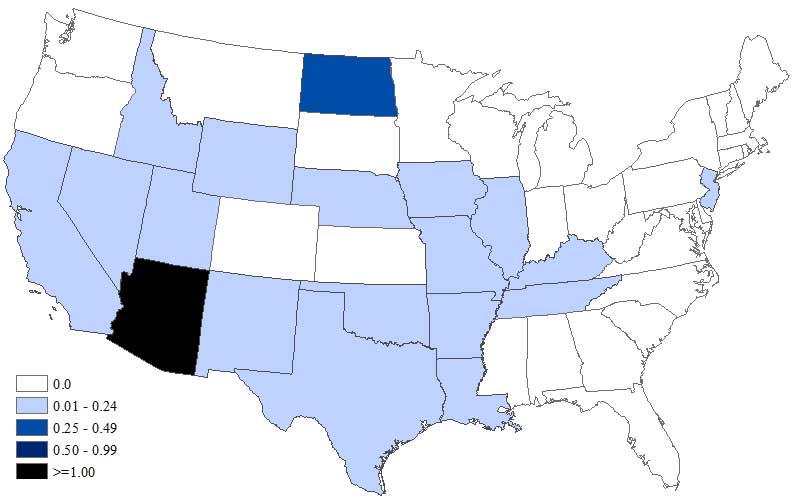Article published Sep 16, 2005
Man battles West Nile virus
Family wants public to gain awareness
By RACHEL TUELLER
rtueller@thespectrum.com
ST. GEORGE - As of July of this year, Washington County resident John Miller led a lifestyle common to many 21-year-olds.
He held a full-time job and was enrolled for classes at Dixie State College.
But things changed quickly in August when bouts of sickness ranging from severe head and body aches, rashes and chills led him and his family on a near month-long search that involved multiple doctors and numerous tests, only to discover Miller had been living with West Nile Virus.
Miller remembers Aug. 19, when he became the sickest.
From the first of August, Miller had been contending with painful headaches, a symptom his mother Darlene thought may have been the result of the dust from the cabinet shop he was working at full-time.
But when John went to work on a Monday morning the symptoms started getting worse - enough that after a few hours, the headache, along with the chills, side aches, nausea and weakness that now accompanied it on the 19th, sent him home, then to the doctor's office. After describing his pain to the doctor, Miller was tested for a brain tumor, a CAT scan was conducted, but results came back negative.
Two days later, Miller woke up with a rash. Small red dots covered his body. The dots weren't bumps, but Darlene worried enough to take him to the Southwest Skin and Cancer Center to see specialists Scott Condie and Dean Duke, who suggested returning to his family practitioner and suggested conducting blood tests for mononucleosis. Those tests also turned up negative.
Just before Labor Day, Duke again contacted Miller's family doctor to recommend blood tests for West Nile Virus. The family spent five days wondering. The Tuesday after Labor Day they called for his test results and were told John was exposed to the illness and that although the acute symptoms were gone, the chronic cells remained in his blood.
When John's parents first learned of his diagnosis, their emotions were mixed. On one hand they finally knew what illness had been inflicting their son after a frustrating and long process with doctors and a battery of tests. On the other, they became worried about the information they read on the Internet about the potential of the virus. Doug was concerned when he read that in some it might lead to memory loss, coma, encephalitis, meningitis or even death.
"It was frustrating not to know what he had. When they found out it was almost a relief, but scary at the same time because people are dying of it," said Darlene.
But today John and his parents breathe a bit easier knowing he made it through the toughest part of the illness but they wanted to get the word out and are hopeful their experience creates awareness of West Nile's presence in Washington County.
"West Nile never occurred to me because he's been here and there's only been some cases of some birds or chickens and some horses reported," his father, Doug, said. "I kept reading in the paper about a horse that died in Washington County. When the man in Vernal died, I thought, people have got to know."
For John, the virus hasn't been so much painful as it is annoying. He's sensitive to light and loud noises and he has good and bad days. "Even still, I have headaches right now," he said. "They gave me medication for that, which hasn't worked very well."
John was told by doctors that symptoms typically last up to two months, so he's hopeful he'll soon be through the woods and looks forward most to returning to work and other usual regimes like school, and dating again, as his father teases.
John admits that he's never been vigilant about wearing repellent, especially after returning five months ago from a mission in the Philippines where he was bitten every day. But, he never contracted malaria or any other diseases and doctors indicated he's likely immune to the virus now.
Doug and Darlene say until now, they've never done much to protect themselves from mosquito bites, either. Darlene's allergies to DEET kept her from using repellent and Doug never sustained many bites. But today they both take measures to cover up when outside.
After the incident with his son, Doug is now reconsidering his plans to move and retire to New Harmony where the family recently purchased property - a locale where he's noticed significantly more mosquitoes than at his Washington City home.
Doug hopes county commissioners from both Washington and Iron counties will consider putting more money into mosquito abatement, especially in areas where irrigation water sits.
News Clips and Information on West Nile Virus Survivors. Videos and links to News Articles on West Nile Virus Families, West Nile Deaths, West Nile Virus Prevention and West Nile Virus Symptoms
Friday, September 16, 2005
Subscribe to:
Post Comments (Atom)
CDC West Nile Virus Info
Skip directly to page options Skip directly to A-Z link West Nile Virus Neuroinvasive Disease Incidence by State 2019 West Nil...

-
Teenage girl in Menifee dies after four-year battle with West Nile illness Download story podcast 10:00 PM PST on Wednesday, December 10...
-
Skip directly to page options Skip directly to A-Z link West Nile Virus Neuroinvasive Disease Incidence by State 2019 West Nil...
-
Tosa man battling West Nile dies Steiner was principal of Wauwatosa West High School By KAWANZA NEWSON knewson@journalsentinel.com Posted: N...

No comments:
Post a Comment